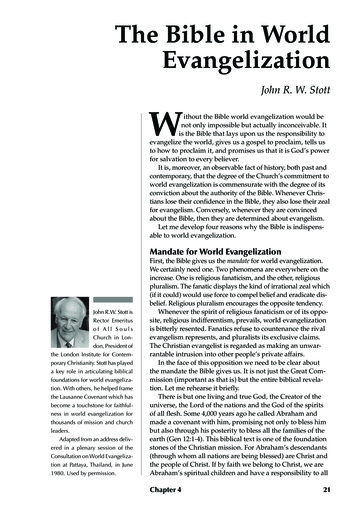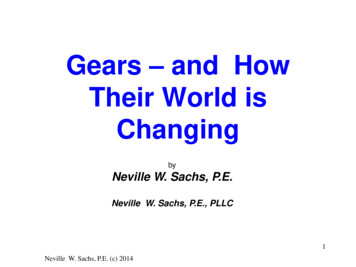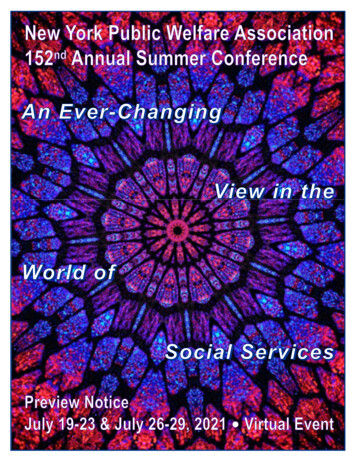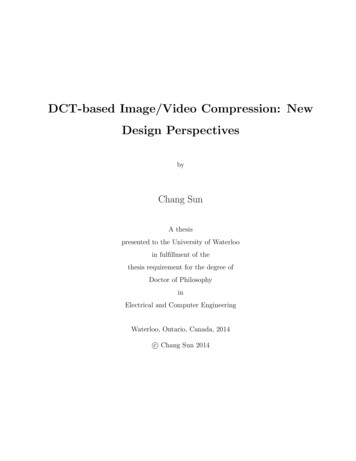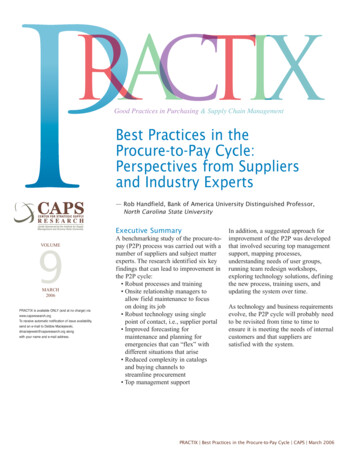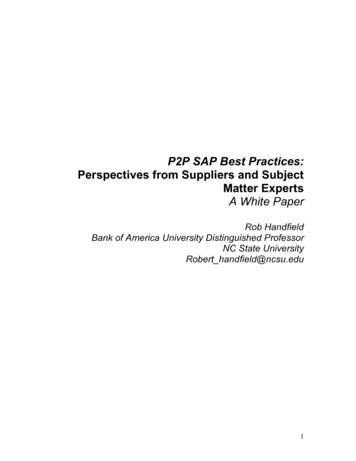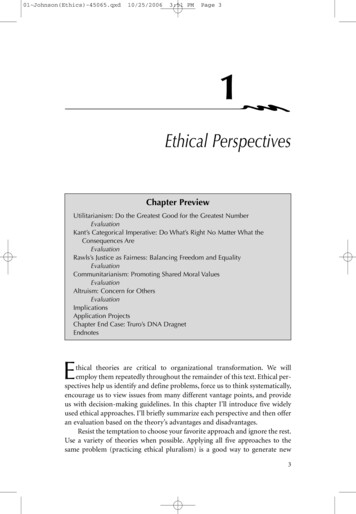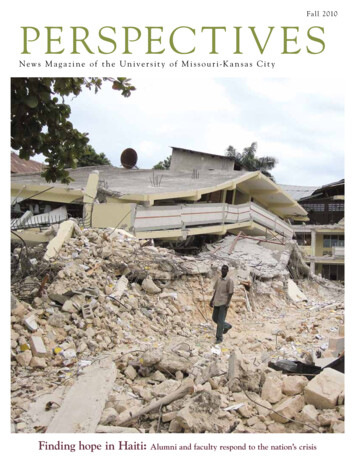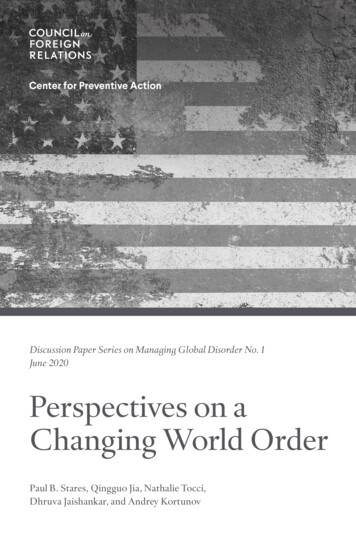
Transcription
Center for Preventive ActionDiscussion Paper Series on Managing Global Disorder No. 1June 2020Perspectives on aChanging World OrderPaul B. Stares, Qingguo Jia, Nathalie Tocci,Dhruva Jaishankar, and Andrey Kortunov
Center for Preventive ActionDiscussion Paper Series on Managing Global Disorder No.1June 2020Perspectiveson a ChangingWorld OrderPaul B. Stares, Qingguo Jia, Nathalie Tocci,Dhruva Jaishankar, and Andrey Kortunov
The Council on Foreign Relations (CFR) is an independent, nonpartisan membership organization,think tank, and publisher dedicated to being a resource for its members, government officials, business executives, journalists, educators and students, civic and religious leaders, and other interestedcitizens in order to help them better understand the world and the foreign policy choices facing theUnited States and other countries. Founded in 1921, CFR carries out its mission by maintaining adiverse membership, including special programs to promote interest and develop expertise in the nextgeneration of foreign policy leaders; convening meetings at its headquarters in New York and in Washington, DC, and other cities where senior government officials, members of Congress, global leaders,and prominent thinkers come together with CFR members to discuss and debate major internationalissues; supporting a Studies Program that fosters independent research, enabling CFR scholars toproduce articles, reports, and books and hold roundtables that analyze foreign policy issues and makeconcrete policy recommendations; publishing Foreign Affairs, the preeminent journal of internationalaffairs and U.S. foreign policy; sponsoring Independent Task Forces that produce reports with bothfindings and policy prescriptions on the most important foreign policy topics; and providing up-todate information and analysis about world events and American foreign policy on its website, CFR.org.The Council on Foreign Relations takes no institutional positions on policy issues and hasno affiliation with the U.S. government. All views expressed in its publications and on itswebsite are the sole responsibility of the author or authors.For further information about CFR or this paper, please write to the Council on Foreign Relations,58 East 68th Street, New York, NY 10065, or call Communications at 212.434.9888. Visit CFR’swebsite, CFR.org.Copyright 2020 by the Council on Foreign Relations , Inc. All rights reserved.This paper may not be reproduced in whole or in part, in any form beyond the reproduction permitted by Sections 107 and 108 of the U.S. Copyright Law Act (17 U.S.C. Sections 107 and 108) andexcerpts by reviewers for the public press, without express written permission from the Council onForeign Relations.The Council on Foreign Relations acknowledges the Carnegie Corporation of New York for its generoussupport.
CONTENTS1IntroductionPaul B. Stares6ChinaQingguo Jia12 The European UnionNathalie Tocci18 IndiaDhruva Jaishankar24 RussiaAndrey Kortunov31333437EndnotesAcknowledgmentsAbout the AuthorsAbout the Center for Preventive ActionContentsiii
INTRODUCTIONPaul B. StaresObservers of world affairs like to point to a defining moment or pivotalevent to proclaim the end of one era and the beginning of another. Notsurprisingly, the novel coronavirus pandemic has already spawned muchspeculation that the world will undergo profound change as a consequence, even that contemporary history will forever be divided betweenwhat happened BC (before coronavirus) and AC (after coronavirus).1Historical eras, however, and certainly international orders—the complex amalgam of rules, norms, and institutions that govern relationsamong states at any given time—rarely, if ever, hinge on singular events.They, and the power relationships that undergird them, are simply tooentrenched to change rapidly. For this reason, it is more accurate toidentify transitional periods that span the rise and fall of specific international orders. In these periods, elements of the old order are still discernible, albeit functioning below their peak, while features of the neworder are clearly emerging and playing a more influential role.2Just such a situation appears to exist today. The international orderlargely constructed by the United States in the aftermath of World WarII is still very much in evidence for the basic reason that most statesappreciate its benefits and thus abide by its rules, all on the understanding that America retains sufficient power and influence to enforcecompliance. At the same time, the global distribution of power is inexorably shifting with the rise of new powers as well as influential nonstateactors, such as multinational corporations and transnational terroristorganizations. The United States is also growing more reluctant to bearthe costs of world leadership, especially when it comes to using militaryforce. China and Russia, along with lesser regional powers, have takenadvantage of this reticence in recent years to assert their own interestsIntroduction1
and to undermine the United States’ international standing and authority. Their actions have at times openly flouted the rules and norms of theU.S.-led order without incurring a serious price, which has demoralized its supporters and emboldened its detractors.In addition, the benefits of the U.S-led order and, in particular, themany international agreements that the United States has championedto open up the world to the free flow of goods, services, ideas, and people,no longer look so promising—not least to the many Americans whoselivelihoods have suffered as a consequence. This shift has caused a publicbacklash against globalization not only in the United States but also inmany Western countries that has manifested itself in more nationalistand inward-looking policies. As a result, the political will to defend, muchless extend, the liberal international order is in short supply.Where all this leads is by no means certain. It is still possible to imagine several alternative future orders arising from the current transitionalperiod. One would be a world divided between states that subscribe toopen market economies and democratic forms of governance and thosethat choose not to, likely led by the United States and China, respectively. Another would be an international system organized aroundrival trade blocs and associated political organizations, each dominatedby the principal regional power. Both of these future orders could differsubstantially, depending on whether relations between the constituentelements were essentially cooperative or highly competitive.If previous transitional periods serve as any precedent, the actionsof the major powers will likely determine which of these internationalorders—or a different one—emerges in the future. How the majorpowers have managed these consequential moments in the past is notencouraging, however. Since the beginning of the twentieth century,there have been three transitional periods: from approximately 1913to 1920, from 1938 to 1947, and from 1988 to 1994. In two of these,catastrophic conflicts broke out (World Wars I and II), and the thirdexperienced violent upheavals in the Balkans and the Middle East aswell as in Africa and Asia. Efforts by major powers to create a robust,collective security arrangement in these transitional periods either collapsed or never lived up to their full promise (the League of Nations,the early “Four Policemen” proposal for the United Nations, and thevision of a “New World Order” after the 1991 Gulf War). Moreover,the international orders that followed—while bringing relative peaceand stability—were flawed. Thus, the League of Nations system lackedthe active involvement of the United States and the Soviet Union, thebipolar Cold War rested on the threat of mutual annihilation—and2Perspectives on a Changing World Order
came close to it on several occasions—and the post Cold War orderrevolved around the vagaries of U.S. hegemony.Today, the signs are not promising that the major powers eithercomprehend the risks of the current transitional period or have a clearvision for a new international order that would be broadly acceptableand thus considered legitimate by most other states. If anything, mistrust and friction is steadily growing among them. The United States,China, India, and Russia are acquiring new strategic capabilities andexploiting new operational domains, specifically cyberspace and outerspace, ostensibly to bolster deterrence and improve their nationaldefenses. These preparations, however, can just as easily signal hostileintent and increase the scope for dangerous misunderstandings andunintended military escalation during acute crises. In short, the prospect of a war breaking out between two or more of the major powers,something that was generally considered to be risibly improbable just afew years ago, is no longer unimaginable.Growing strategic rivalry among the major powers has also startedto play out in many regions of the world as each increasingly maneuvers for influence and advantage. If the experience of the Cold Warprovides any guide, this competition could exacerbate local sources ofinstability and conflict. At the same time, the United Nations’ ability toaddress, much less resolve, these and other threats to peace is decliningas the organization becomes consumed by growing acrimony amongthe major powers and thus essentially as deadlocked as it was for mostof the Cold War. Finally, cooperation on a host of critical global challenges and common security concerns—particularly nuclear proliferation, transnational terrorism, public health threats, and the interactingeffects of climate change, resource scarcity, and environmental degradation—seems also likely to suffer. Those problems can be meaningfully tackled only through collective international action, which isunlikely to coalesce without impetus from the major powers. Despitea common interest in addressing those threats, increasing mistrust andantagonism will only make the task more difficult. The poor level ofinternational cooperation on the COVID-19 outbreak—certainly inits initial stages—stands in stark contrast to what happened during the2008–09 financial crisis and would appear to validate this fear.It was with these concerns in mind that the Center for PreventiveAction (CPA) at the Council on Foreign Relations launched the Managing Global Disorder project with the generous support of the CarnegieCorporation of New York. At the outset, CPA thought it valuable to getdifferent perspectives on the state of the world from leading scholars inIntroduction3
each of the major powers.3 Each scholar was asked to address a commonset of questions about the current international order—its current state,its likely future evolution, the risk of major war, and the prospects forcooperation on common security concerns and other global challenges.The answers, which were drafted before COVID-19, vary considerably,which is not surprising given their different vantage points.Qingguo Jia from China argues that the post–World War II orderis not ending but is clearly in “serious trouble” as a result of recentdevelopments. Military conflict among the major powers, particularlybetween the United States and China, remains unlikely, however, giventhe shared incentives to avoid such a catastrophe. Their relationshipwill nevertheless grow more competitive. If the current internationalorder is to be sustained for the benefit of all, the leading powers willneed to work together to reform its working practices and institutionsin a mutually satisfactory and sustainable way.Nathalie Tocci from Italy is much less sanguine. She sees the liberalinternational order as “fraying” badly, and though the risk of war is notpreordained, “potent drivers” are at work that make it more likely. TheEuropean Union (EU), she argues, needs to wake up to the evolvingreality of growing rivalry among the major powers and develop a coherent and practical new strategy for defending EU interests and preserving the multilateral institutions of the current rules-based internationalorder. The world will become more unstable and dangerous if the practice of multilateralism is replaced by narrow, nationalistic approaches.Dhruva Jaishankar from India also views the world as in a transitional phase, but, unlike Jia and Tocci, sees it evolving in a more complex way with elements of unipolarity, bipolarity, and multipolaritycoexisting uneasily. He shares Tocci’s concern, however, that if current multilateral approaches to international problem-solving become“undermined, bypassed, or disregarded,” then the risk of great powerconflict will increase. The development of new and potentially threatening military capabilities, the trend toward economic “decoupling,”and rising nationalism around the world are all concerning. To avoidthe world growing more fragmented and dangerous, existing globalgovernance institutions will need to adapt and new ones be created toaccommodate rising powers.Andrey Kortunov from Russia sees the world as entering a periodof increasing volatility if the leading powers do not adjust to its newrealities and new imperatives. In contrast to the other commentators,however, he sees the greater risk stemming less from great power competition and more from the uneven reach and benefits of globalization.4Perspectives on a Changing World Order
This is leaving many parts of the world further behind in terms ofliving standards and future prospects. Conflict in the future is morelikely to occur, he believes, between states that are the winners and thelosers of globalization—the haves and the have-nots—as well as withincountries where the socioeconomic disparities are greatest. The majorpowers, he argues, should not only develop new crisis managementmechanisms to lessen the ancillary risks of their growing rivalry butalso work together to ensure that global institutions such as the UnitedNations, as well as various regional bodies, are able to manage thesegrowing international schisms.While each of these scholars views the world today and the challenges that lay ahead in different ways, they share a common beliefthat the opportunity to shape a new international order that is stable,inclusive, and beneficial to all still exists, though the window to do thisis growing smaller. The experience of earlier transitional periods suggests that any effort to reform or create a new global order must be acollaborative undertaking. It cannot be imposed or established by anymajor power acting alone or even in concert with another. The same istrue for managing the major challenges that humanity now confronts.Although the world seems destined to grow more competitive, congested, and contested in the coming years, the logic of major powercooperation is inescapable.Such cooperation will be rendered more difficult, if not impossible, if the major powers grow increasingly fearful of each other’s strategic intentions. Meaningful cooperation requires basic mutual trustand security, which will not arise spontaneously. The major powerswill, therefore, need to provide active reassurance through formalagreement, where possible, and informally when this is not politicallypractical. The goal should be to create a stable and mutually beneficialunderstanding that accepts the reality of strategic competition as wellas the imperative of coexistence. At a minimum, this objective willrequire a deeper appreciation of each country’s core national securityinterests and a renewed commitment to the fundamental internationalprinciples of political sovereignty, domestic noninterference, and territorial integrity. In some areas, the major powers will also need to practice reciprocated restraint on activities deemed potentially threatening,as has been done in previous eras of major power competition.The subsequent discussion papers in this series explore in greaterdepth how to promote a stable and mutually beneficial relationshipamong the major powers that can in turn provide the essential foundation for greater cooperation on pressing global and regional challenges.Introduction5
CHINAQingguo JiaRecent tensions in China-U.S. relations appear to support the claimthat the post–World War II international order is coming to an end. Inits place is a return to the great power rivalry and beggar-thy-neighborcompetition that characterized the pre–World War I era. Careful analysis, however, shows that the postwar order is in no way over. Instead, it isevolving. Despite serious challenges and innate problems, it will persistas long as the great powers—and others—pursue necessary reforms toaccommodate their respective interests while also taking care of thoseof others. All countries would benefit from sticking to the prevailinginternational order and making it work.THE ORIGINS OF THE CURRENT INTERNATIONAL ORDEREmerging from World War II as the preeminent world power, the UnitedStates was instrumental in creating a new international order, primarilybecause it realized that shaping the rules, norms, and institutions of thenew era would protect its global interests. Maintaining world order is,however, a costly business. As Paul Kennedy describes in his book TheRise and Fall of the Great Powers, great powers decline not because risingpowers defeat them but because the cost of maintaining world orderdrains their resources. To avoid or postpone this, the United States didthree things in the wake of World War II: preserved and enhanced itswartime system of military alliances, established a UN-centered groupof international institutions and mechanisms, and developed partnerships with other countries. Through these efforts, the United Stateseffectively enlisted others to help maintain world order at minimal cost.But ensuring that help entailed costs and constraints for the UnitedStates. These included providing and coordinating initiatives for6Perspectives on a Changing World Order
international action; abiding by the rules and norms of various institutions, occasionally even at the expense of perceived U.S. interests; anddealing generously with allies and partners, including burden-sharingwithin alliance arrangements and allowing access to markets. At times,the costs have seemed excessive to American voters, leading to demandsfor more contributions from others. However, successive U.S. administrations, until that of Donald J. Trump, had decided that the benefits outweighed the costs and largely maintained the arrangement. In retrospect,the United States has benefited tremendously from such practices. Mosttelling, it has remained the preeminent global power for seven decades,despite the challenges of the Cold War and its aftermath.THE ORDER IN CRISISThis international order is now in serious trouble. The United States’willingness to maintain world order has significantly declined, particularly under the Trump administration. Although every previous U.S.president put U.S. interests first in foreign policy, the Trump administration has gone much further both in rhetoric and action—oftenat the expense of other countries and, in the long run, of the UnitedStates. Moreover, it has turned away from its leadership responsibilities in world affairs and even taken actions that have undermined existing international institutions, including withdrawing from the UNEducational, Scientific, and Cultural Organization (UNESCO), theTrans-Pacific Partnership, and the Paris Agreement on climate change.The Trump administration has also challenged World Trade Organization (WTO) rules by taking unilateral actions against other countrieson trade disputes. Although this is not the first time the United StatesChina7
has pursued its interests at the expense of others or defied internationalinstitutions, the breadth and scope of the Trump administration’sactions are categorically different. Given the pivotal role the UnitedStates plays in maintaining the world order, it can inflict significantdamage and has done so.The capacity of Western countries, which have been the strongestsupporters of the current world order, to maintain that order has alsodeclined sharply, especially since the end of the Cold War. Statisticsshow that the share of the world’s gross domestic product of Group ofSeven (G7) countries—the United States, Canada, France, Germany,Italy, Japan, and the United Kingdom—dropped from 68 percent in1992 to 47 percent in 2015.1 It dropped again to 30.15 percent in 2018and is projected to go down to 27.26 percent in 2023.2 Although thedecline in military capabilities is more moderate, North Atlantic TreatyOrganization (NATO) spending has also shrunk from two-thirds ofglobal defense spending to little more than half in 2017.3 On top of this,the Trump administration’s America First policy has strained the unityof the West. Since the end of World War II, the West’s ability to maintain the world order has never been weaker.Other major countries have become increasingly dissatisfied andfrustrated with existing international arrangements as well. Russiabegrudges NATO expansion; India is unhappy with the perceivedinadequate international recognition of its status as a great power; andChina is frustrated that its voice and interests have not received dueattention and respect. Those countries and others are seeking a changein the current international arrangement. China’s efforts to assert itsinterests receive the most attention. As the leading rising power, Chinahas created a number of initiatives to improve international cooperation, most notably through the Asian Infrastructure Investment Bankand the Belt and Road Initiative. These demands, given the sharplyincreased capabilities of the countries making them, have also strainedthe extant world order. For those and other reasons, the postwar worldorder is facing an unprecedented crisis.PROBLEMS WITH THE EXISTING INTERNATIONAL ORDERSome countries have lamented its decline, but the post–World War IIorder does have real problems. First, in the absence of effective checksagainst it, the United States has operated as the indispensable—andfor many years undisputed—leader. This status has allowed it to abuseits power, at times even at the expense of its own interests as well as8Perspectives on a Changing World Order
those of others, despite its professed good intentions. Washington hasnot always been prudent in conducting foreign policy, as evidenced byits decision to fight wars in Iraq and Vietnam, withdraw from international organizations, initiate trade wars despite WTO rules, and dragits feet in reforming international institutions. Power corrupts. Thisapplies not only to domestic politics but also to international politics.Second, the existing world order is excessively West-centric.Although Western countries do advocate certain worthy values, theydo not have the right to dictate what other countries should do in theirpursuit of political stability and economic development. Because everycountry faces a unique set of circumstances at home, the Western modeldoes not always apply. That few developing countries have made it intothe rank of developed countries over the past seven decades, despite theWest’s tremendous efforts—from a position of strength—to imposeWestern models, shows that this model has real problems in catering tothe needs of developing countries.Third, although the U.S.-led system of military alliances has beenuseful in helping maintain peace and stability, it is also exclusive anddivisive. By default, it divides countries into allies and others. Thisapproach has ensured alienation and suspicion on the part of the othersand has provided a fertile ground for zero-sum interactions, makingsecurity cooperation difficult if not impossible.Fourth, the existing economic order attaches considerable importance to efficiency, sacrificing equality. Under this order, the world hasmade great strides in liberalizing cross-border trade and investment,yielding an era of unprecedented prosperity. However, although a freermarket has led to increased efficiency, it has also engendered greaterinequality. Calls to address inequality are dismissed as calls for socialismand not taken seriously. Consequently, polarization is increasing bothwithin and between countries, along with anti-globalization protests.THE FUTURE OF WORLD ORDERDespite its flaws, the current world order is still the best that humankindhas created. Through established institutions, states champion universally accepted values and principles such as sovereignty, nonaggression,nonintervention in the internal affairs of other countries, human rights,rule of law, free trade, and the principle of common and differentiatedresponsibilities. States generally observe international laws and normsin light of the values and principles espoused by these institutions. Platforms have been created that offer countries an opportunity to air theirChina9
frustrations with international arrangements and discuss ways andmeans to address pressing global issues. Another world war has thusfar been avoided and unprecedented prosperity has been achieved. As aresult, few countries have completely rejected the world order, regardless of any grudges they have against it.Most nations have a stake in the existing order and are thereforemore likely to stick with it. Wealthy countries expect that their wealthwill be protected and poor countries expect aid when they are desperate. Both strong and weak states expect international laws and normsto protect their interests, one way or another. Most concerns are aboutperceived injustices in the distribution of benefits than about absolutelosses. Some countries could be unhappy with a particular piece of anexisting international arrangement but have no intention of overthrowing the world order as a whole in favor of a nineteenth-century arrangement (might is right). Thus, despite the U.S. withdrawal from someinternational institutions, most countries have chosen to stick with theexisting order, whether by staying in institutions such as UNESCO andthe Universal Postal Union or by observing the Joint ComprehensivePlan of Action and the Paris Agreement on climate change. Even risingpowers such as China and India, which feel that the world order has notgiven their voices and interests adequate attention and respect, call forreform rather than replacement. For example, India wishes to be a permanent member of the UN Security Council and China hopes that itsvoting shares in the World Bank and International Monetary Fund willincrease to reflect its growing economic clout.Furthermore, although tensions between China and the UnitedStates are increasing, they will likely remain limited. Both are nuclearweapons states, both have stakes in the existing order despite unhappiness with aspects of it, and both are more or less interested in maintaining their shared economic relationship. Under these circumstances,neither fighting a war nor decoupling their economies is a realisticoption. The relationship could become more competitive, but Chinaand the United States have thus far continued to observe the Code forUnplanned Encounters at Sea in the South China Sea and to negotiatetrade agreements, indicating that they know they should find a way tocoexist. They are still cooperating on many issues, including pressuringNorth Korea to give up nuclear weapons, fighting international crimes,ensuring international aviation safety, and dealing with pandemic diseases such as COVID-19. Moreover, most other countries have a vested10Perspectives on a Changing World Order
interest in a stable and constructive relationship between China and theUnited States and refuse to take sides.Finally, given the United States’ stake in the existing world order andthat it can protect its interests only by maintaining that order, Washington will possibly have second thoughts about its current policies. Afterall, the Trump administration’s policies thus far are an exception ratherthan the rule in post–World War II U.S. activities. A future administration could see things differently and adopt a watered-down version oftraditional U.S. foreign policy.The world order is evolving, but most established institutions andnorms will likely remain. The United States will stay a leading powerbut could be less dominant. The West will continue to play a pivotalrole but the world order will likely be less West-centric. When power ismore diffuse, the world could be less efficient in addressing global challenges; at the same time, it could also adopt an approach that is moreequal and consultative. The rising powers will likely have more powerbut also more responsibilities. Despite concerns about the decline ofworld order, countries can choose to transform it for the better.To turn hope into reality, the major powers, especially China andthe United States, should take up their respective responsibilities. Theyshould resist the temptation to blame each other for the problems ofexisting institutions. Instead, they should carefully assess these institutions and identify areas that need improvement. They should consultwith each other on that basis and jointly find a way to reform the extantinternational order in a way that accommodates their respective interests without undermining the interests of others. As the COVID-19pandemic shows, the world is interconnected and mutually dependent.The only way to effectively deal with global issues is to embrace collaboration and cooperation. For a better future, cooperation is not a choice;it is a necessity.China11
THE EUROPEAN UNIONNathalie TocciThe liberal international order, within which the European project wasestablished and is embedded, is fraying. This trend has been buildingup for more than a decade now. As Paul B. Stares argues, the world mayhave been living through a transitional period akin to those of 1913 20,1938 47,
vision of a “New World Order” after the 1991 Gulf War). Moreover, the international orders that followed—while bringing relative peace and stability—were flawed. Thus, the League of Nations system lacked the active involvement of the United States and the Soviet Union, the bipolar
